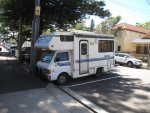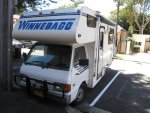NZ is a first world country with modern conveniences and low sulfur diesel. Fuel is expensive, but a big part of that is road taxes. Diesel vehicles are taxed differently. They pay Road User Charges (RUC) by their gross weight and vehicle class. These are paid per km, and done when you register vehicle. Some vehicle classes are cheaper, so check the fee schedules. Some pick-ups (called utilities or "utes") have a lower tax rate or can be written off on business taxes. So there are quite a few flatbed pickups (utes) with 4x4 running around.
Imported new vehicles are expensive, however smaller used Japanese imports (from japan) are not very expensive, and good on fuel.
True 4x4 roads which are needed to access an area are not common in NZ. There are plenty of 4x4 trails about, but you can easily bypass them on a paved road in most cases. You wan't something that rides well on undulating roads, as the constant rain, and paving method they use results in roads quite different than most north americans are used too.
Used older vehicles are not very common in NZ. At least not ones old enough to import in the USA. Anything up to about 68" track width and 23ft long should not pose any real problems on the roads. Larger than that can push up the pucker factor on secondary roads.
Another option is to buy a 30ft RV of some style, or a caravan (trailer). These can easily sleep 4. Have a smaller SUV to tow it. Given the lower speeds, there is no need to a big tow vehicle which eats fuel and is annoying to drive and park. A lot depends on the exchange rate, but be prepared for some sticker shock. Everything is imported, and the importers take a big chunk... You will find that just about anything specialty or even less common vehicle parts are about half the costs imported via international mail. We just ordered stuff and have it shipped combined.
You could possibly import a caravan (RV trailer). There is some electrical and propane stuff that needs to be done, but would not be expensive if done before shipping. You would likely make most of your shipping costs back on the sale, maybe even some profit. All RVs/campers that want to use the free camps all over NZ must have a self containment certification. This means checking your plumbing, water, toilet etc to meet the specs. If you want to plug into the electrical at a camp or RV park you need an electrical cert, which is similar.
A newer LHD rig can only be imported for a year or maybe 18 months using a carnet. Any longer is generally not possible without conforming the vehicle to NZ road safety standards. Which for all intents and purposes is not possible.
Depending on where you are in NZ, it can rain, a lot. If you are planning on outings farther from home, I would strongly consider a high roof van. Being able to wait out a rainstorm in a place where you can stand is a great feature. If you are heading out closer to home, this less of an issue. If you plan on winter outdoor activities, you will not enjoy a RTT. Some parts of NZ have more reasonable winter weather, and it varies dramatically with elevation and latitude.
I would never expect to exceed 50km/hr average speed in NZ, except maybe a few of the motorways around Auckland.
My wife and I shipped our camper to NZ, and spend 8 months there living and traveling about. There is info on our travels, and shipping experiences on our blog.
http://vagariesabound.blogspot.com/




